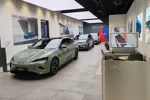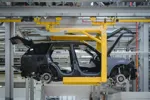As an increase in the flow of newer used cars and a narrowing of margins begin to shift the stakes for independent dealers, the car supermarkets are reaping the rewards.
Efficiently operated PDI centres are turning around cars in less time and an array of finance, servicing and loyalty-related schemes designed to boost buyers’ confidence are all contributing to a boom period for the major players.
 Among them is The Car People, fifth in the ID50, which has mapped a course for success since the lows of 2008/09 and is currently entering an “aggressive period of growth”.
Among them is The Car People, fifth in the ID50, which has mapped a course for success since the lows of 2008/09 and is currently entering an “aggressive period of growth”.
Following a nine-month strategy designed to update its processes and increase customer loyalty, the business is building on the success of its £169.4 million turnover in the year ended April 30, 2015.
Profits after tax for the business, which stocks about 2,300 cars valued at just over £21m, stood at £4.2m in the same 12 months, meanwhile, with £1.4m of dividends paid to shareholders.
About 40% of the company’s profits are delivered by its first site, at Calder Island Way, Wakefield, but this is now operating at capacity. With its Sheffield and Ashton sites also growing, the business is extending its West Yorkshire headquarters from eight-and-a-half to 12 acres – increasing its capacity to more than 800 cars.
The Car People’s managing director Martyn Carnell and director of sales Jonathan Allbones – two of four key shareholders who each own just less than 25% of the business – said the move is expected to boost its profits by a further 20%.
The pair said the business will open a new, 12.5-acre facility – its largest to date – in Warrington before the end of 2016.
Both seemed eager to take their next step.
Allbones said: “In the past year, we have sold over 17,500 cars. Year-on-year we are about 7% up on volume, following a 5% rise a year earlier. Our Wakefield site is operating at capacity, we are experiencing impressive growth at Sheffield and Ashton is also on the rise. The timing is right for us to move into new areas. It’s an exciting time for us.”
“After the work we have put in to streamline the business and maintain our customer base over the past year, it is encouraging to move into this new phase,” said Allbones.
“What people will see in the coming year from The Car People is quite an aggressive period of growth. It’s something I’m looking forward to.”
“We want people to enjoy visiting our sites and, even if they don’t buy a car, go away with a strong idea of what we offer” Martyn Carnell, managing director, The Car People
Carnell added: “I’m really excited about the potential of the new site. We currently have the Warrington plans out for tender and we’re hoping to move fairly fast to get spades in the ground, hopefully getting things under way at the beginning of May.
“At the moment we have around 450 staff and I think that will grow by around 150 by this time next year.”
The expansion comes 16 years after The Car People was first established with aspirations of operating across six sites by the end of 2005 and retailing 5,000 cars in its first year, gradually growing to 10,000.
The more pragmatic growth of the network suggests that the business is not one to gamble, but its sales are now approaching double those initial projections, from sites far larger than it might have anticipated would be sustainable.
A relaxed, family-friendly sales environment
Opened in 2007, the Sheffield site features a customer lounge with iPad-based research hubs where visitors can view site stock and compare prices and finance offers online.
At the heart of the facility is a large pink archway – reflecting the business’s corporate colour scheme – and to the rear of the large, open area is a children’s soft play area.
Allbones said the relaxed and family-oriented feel is central to The Car People brand. He said: “We know that customers will come to view cars with their children and this is an ideal way to make them feel at home and alleviate some of the pressure of occupying them while they are here.
“Having said that, we have become aware that children of a certain age really enjoy engaging in the buying process.”
Carnell said sales staff were trained to acknowledge customers and make them feel welcome, but otherwise allow interested customers to approach them, with no pressure applied during the browsing or buying process.
He said: “We’re not here to sell people cars and send them on their way in a vehicle no matter what. We are here to facilitate sales in the most pleasurable and rewarding way possible for the customer.
“Ultimately, we want people to enjoy visiting our sites and, even if they don’t buy a car, go away with a strong idea of what we offer and without qualms about returning or recommending us to a friend or family member.”
“Whatever we buy will go out of the front door. We will never send it to auction” Jonathan Allbones, sales director, The Car People
Since last July, 34,000 customers have signed up to be part of The Car People’s Friends Portal, a loyalty club scheme, and that figure is growing by about 1,000 each month.
Allbones said: “Our focus last year was very much on building our loyalty programme. In Wakefield, 63% of our sales are repeat custom or the result of recommendations and that is something we wanted to retain and also build on.”
The Friends scheme benefits customers through the provision of servicing with a labour rate of just £40 an hour, cut-price tickets to entertainment events and the opportunity to borrow satnavs and other equipment for short periods.
Allbones described the scheme as an “online self-service portal” for customers to manage their car ownership experience. Customers can access details of their next MOT, service or road tax renewal via an online dashboard.
The Car People said the portal’s success has been reflected in the workload of its aftersales departments.
Previously, the workshop worked a nine-hour day, five-a-half days a week. A combination of retail work and increased sales prompted it to move to a shift pattern of 12-hour days, seven days a week. Teams of 10 technicians now work 12-hour shifts in a four days on, four days off pattern.
The Friends scheme is backed up by a pair of call centres, which also deal with incoming telephone and live chat enquiries via the brand’s website. The portal has helped to maintain a relationship with customers and grow the customer database.
Call centre staff – available until 9pm, seven days a week – carry out post-sale calls to deliver CSI questionnaires, which help Carnell and Allbones monitor the success of their operation and make changes where necessary.
Allbones said: “We sell around 1,500 cars a month on average and tend to record maybe five score cards of one or two out of five for our overall service. It gives us something to work from.”
Streamlining sales with in-house technology
Two years ago, The Car People decided to bring its website in-house to ensure it was developed in line with customer expectations.
The process of designing and implementing a tailor-made website coincided with the roll-out of a DMS system that made buying and selling easier for staff and customers alike.
Sales staff equipped with iPads can roam around a site, inputting information directly into the DMS as they speak to a customer, while having remote access to finance quotes and part-exchange estimates.
Putting iPads in the hands of sales staff echoes the transparent approach the business took with its research hubs.
Carnell said: “Our customers are familiar with iPads and it is good for them to be able to view what our salesman see in a familiar format as they move around the forecourt.
“Often it is the salesmen who are doing more of the research on the forecourt, as customers are coming to us so well informed after their own online research that they might know more about a particular car than our staff.”
Allbones agreed about the amount of pre-visit research customers were doing: “Customers are still completing the same three-month research process, but instead of doing that on the forecourts, they are doing it at home. By the time they reach us, we will be one of two or three sites they plan to visit and they will know exactly what they want and how much they want to pay.”

The Car People said it puts no pressure
on its staff to sell add-ons
He said just 5% of The Car People’s sales were the result of cars being viewed online and a deposit paid without the customer physically seeing the vehicle. Allbones said the internet had not broadened the reach of its target customer base, which he said lives within a 30-minute drive from each site.
However, he added: “The internet’s effect has been marked. Our footfall is actually less than it was five or six years ago, but whereas six years ago we would capture half of the customers that came in and sell to about a third of that half, nowadays we capture around 90% and sell to 55%, with no pressure applied from our sales staff.”
Carnell said the used market is entering a phase where vehicles must be priced to sell – a situation the car supermarkets are ideally placed to embrace.
“Making sure we buy the right stock and keep PDI costs down is the key and I think we do a good job of that, carrying out PDI at each of the three sites, rather than having one centralised location,” he said.
A team of six roving buyers and two office-based staff source appropriate stock for the three sites, buying according to a “shopping list” compiled on The Car People’s DMS.
Appropriate purchases must be between one and six years old with a value of between £4,000 and £30,000 and fulfil a demand determined by forecourt sales and data drawn from The Car People’s own log of online enquiries. Drawn from all sources, the vehicles are logged – again into an iPad-based system – as soon as they are purchased, to avoid duplication. The buyers can also upload data straight into the online stock inventory visible to customers.
Allbones said: “Our buyers have to travel some miles to source exactly what we need, but the market is all about supply and demand, so we don’t go far off script.
“Whatever we buy will go out of the front door. We may reduce the price, but we will never send it to auction if we’ve bought it.
“In terms of part-exchanges, if they don’t suit our needs they go straight to auction at a price to sell first time around.”
Taking a no-pressure approach to add-on sales
The Car People sell add-ons that would be familiar to most franchised dealer networks.
For Carnell, who, with his brother Paul, sold a 12-outlet car and motorcycle dealer group to Dixon Motors for £12.4m in 1997, it is essential that his used operation keeps pace with the new car market on all fronts.
“They are still our main rivals,” he said.
In marketing terms, that means The Car People is a regular advertiser on Granada Television to promote its Ashton site and also teams up regularly with radio stations to deliver targeted promotions.
At the point of sale, The Car People offers its customers a range of services and aims to deliver them with the same FCA-compliant, low-pressure approach as its vehicles. The sales teams earn a high basic and fixed unit payments.
A finance broker service delivered via an online application (in partnership with Equifax) allows customers to compare offers from a number of providers in a “soft search” that will not affect their credit scores.
On its Friends portal, The Car People sells service plans (through a partnership with Emac), as well as GAP insurance, Supagard paint treatments, tyre and alloy wheel insurance and extended warranties.
Allbones said lenders have a “huge appetite” for financing The Car People’s customers. Its finance penetration stands at 50%, while it is about 34% for GAP insurance, 24% for paint protection and 15% for tyre and alloy insurance.
However, Allbones said: “These are services that we offer to broaden our offer to customers, but there is no pressure on our salesman to make sales and we only choose the products that we feel are appropriate at the lowest possible price. They are not a revenue driver.”














Login to comment
Comments
No comments have been made yet.